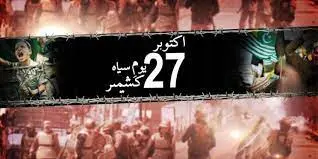Qirat Mirza
October 27th is marked as a Black Day in history when Indian troops forcefully took control of Kashmir by militarily invading it against the wishes of the Kashmiris. Since it’s a Muslim-majority state, its choice should be deemed crucial in deciding whether to join India or Pakistan, as per the partition plan. Kashmir has been fighting a battle against India to preserve its national identity and territorial integrity, which predominantly came at stake after India’s illegal and unilateral decision to amalgamate it with itself on August 5, 2019. Since both decisions were against the will of the Kashmiris, India has been carrying out inhumane activities and promoting censorship to crush any kind of insurrection and policies aimed at making them a minority in Kashmir. Therefore, it labels Kashmir’s rights to self-determination and deterrence as terrorism and Islamic radicalization. This is evident from the statement by the Jammu and Kashmir president of BJP, who said, “Just wait and watch. Abdullah, Muftis, Azads, and others shall have to chant ‘Jai Shri Ram’ while also calling them terrorists.” They are also apprehending human rights activists and journalists on fake charges of terrorism, such as having links with ‘terrorist organizations’.
Karl Marx recounted that the causes behind any conflict are never religious but social and political factors. Therefore, India is responsible for escalating the conflict by introducing policies that are depriving Kashmir of its land. For instance, India has a notion of Akhand Bharat and believes in Rashtra policies. According to it, there should be Hindu hegemony within India, and all laws should be based on Hindu religious laws.
Religious freedoms have been under sustained attack for an extended period in occupied Jammu and Kashmir. There are frequent restrictions on religious gatherings, continuous surveillance on mosques and religious leaders, and socio-religious organizations like Jamaal e Islami are banned under draconian laws like the Unlawful Activities (Prevention) Act (UAPA), and congregational Friday prayers are banned. In 2019, no prayers were allowed in Jamia Masjid for 24 Fridays. In 2018, for 12 Fridays, prayers were disallowed in Jamia Masjid. In 2017, prayers were not allowed for 18 Fridays, and in 2016, following the civilian uprising, Jamia Masjid was locked down for 19 weeks. From 2018-2019, many cases of humiliating Shia Muslims by using pellet guns and weapons and detaining them were documented in the month of Muharram. Secondly, they are also issuing fake domiciles to non-Kashmiris, giving them settlements in Kashmir by allowing them to buy land in Kashmir. India is doing this in anticipation of unforeseen challenges, namely, if it has to hold a plebiscite in the future due to international pressure, there would be Hindus to choose the side of India.
Cultural heritage protection can empower communities to exercise autonomy over their traditions, practices, and values, helping to ensure that they are not suppressed or assimilated by external forces. To achieve its goal of Akhand Bharat and deprive Kashmiris of the right to self-determination, India is also attacking Kashmiri’s national and cultural identity by changing the names of Muslim historical sites in IIOJK. According to reports published by The Wire, Kashmir’s water supply department is now called the Jal Shakti department. The Chenani-Nashri Tunnel has been named after Hindutva ideologue Syama Prasad Mookerjee, who was the founder of the Bharatiya Jana Sangh. The Sher-e-Kashmir Cricket Stadium has been given a new name: Sardar Vallabhbhai Patel Stadium. Sher-e-Kashmir was the title given to the second Prime minister of Kashmir Sheikh Muhammad Abdullah, who raised his voice against Dogra ruler Maharaja Hari Singh and led the ‘Quit Kashmir’ agitation against him. Besides, Urdu is no longer the sole official language of IIOJK. The Jammu and Kashmir Official Languages Bill, 2020, which was introduced in Lok Sabha on September 22, 2020, and in the Rajya Sabha the next day, states that “Kashmiri, Dogri, Urdu, Hindi, and English shall be the official languages used for the official purposes of the union territory”.
Kashmir is an international dispute, and there are many resolutions passed by the United Nations Security Council for holding plebiscites and giving the right to self-determination to the people of Kashmir. India should be held accountable for continuously violating international laws and unilaterally making decisions on Kashmir without taking into account all parties involved in the conflict, namely Pakistan and the Kashmiris. War can never be an option for achieving long-lasting peace in the region. Secondly, as the moral and diplomatic supporter of Kashmiris on international platforms, Pakistan needs to invest in building scholarly work on Kashmir by establishing Kashmir institutes and providing proper insight for addressing the Kashmir conflict by comprehending all its new dimensions.
[The writer is a student of International Relations at the International Islamic University, Islamabad, and is currently serving as an intern at the Kashmir Institute of International Relations.]










